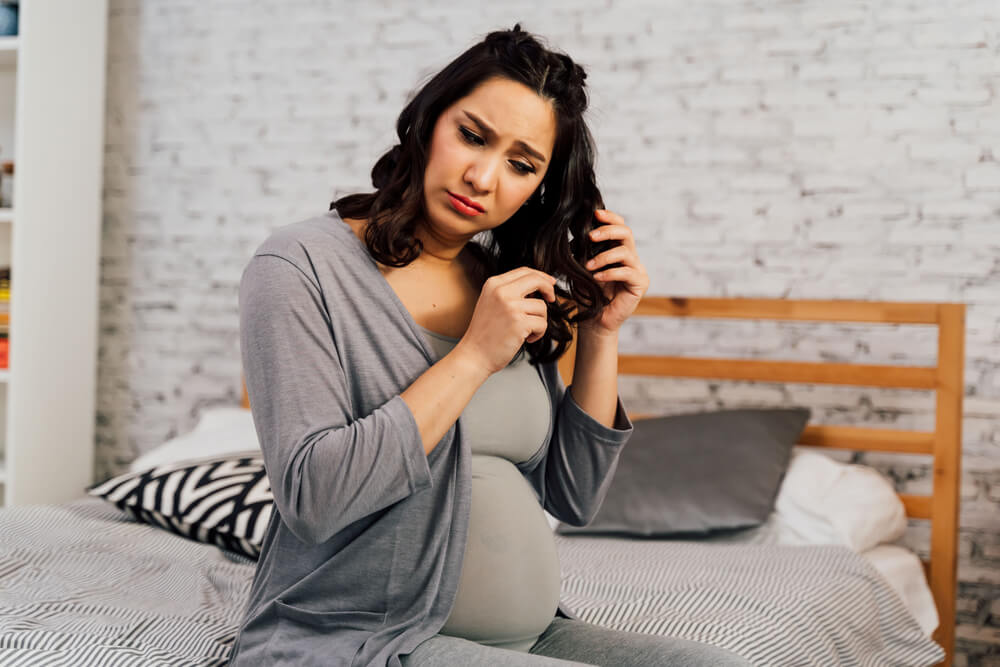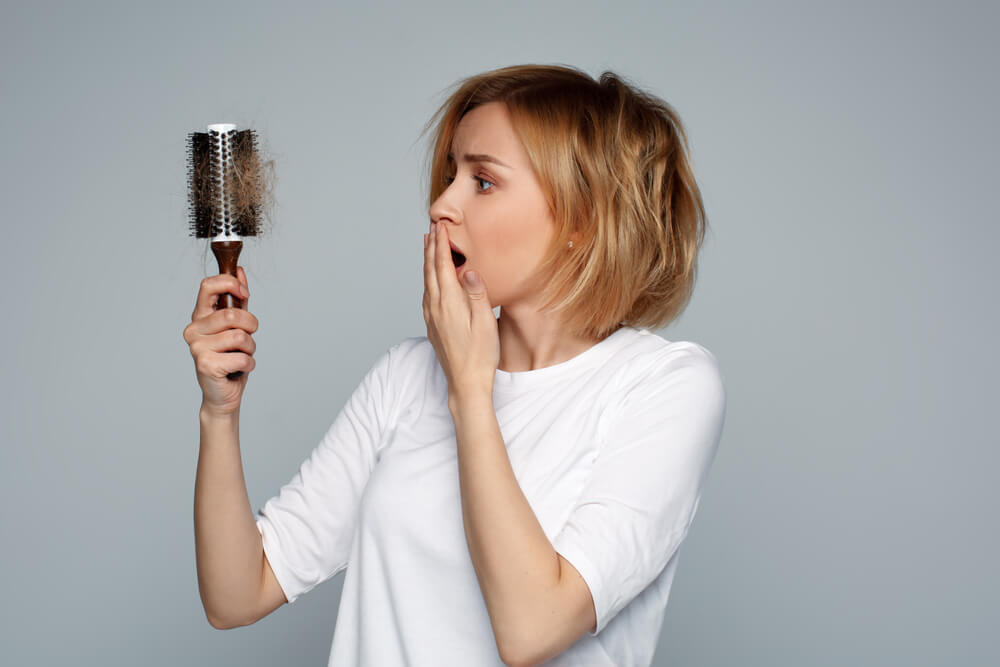What is Hair Loss After Pregnancy?
Hair loss following pregnancy or postpartum hair loss is a condition in which the mother starts to lose their hair excessively after giving birth. The condition is a result of undesired hormonal changes that mostly occur after or even during pregnancy.
In this article, the expert team at University Park OBGYN aims to talk more about postpartum hair loss, postpartum hair loss treatments, and possible preventive measures expecting mothers may take.
Hair Growth: How Does It Work?

To better understand hair loss after pregnancy, we must also understand how hair grows in the first place. Hair growth starts from tiny pores in the scalp’s skin, which are called follicles. Typically, human hair will constantly be growing and shedding, and the entire cycle will have three phases repeating throughout one’s lifetime. The cycle goes as follows:
- The anagen phase is the first phase. It’s active hair growth that can last anywhere from two to six years. This type comprises most of our hair at any given time.
- The catagen phase can be described as a swift period where the hair follicles start shrinking.
- Lastly, the telogen phase is called the resting phase, lasting around three months. After that, the hair is released by the follicles and falls out.
Hair Loss After Pregnancy: How Does it Happen?
For the most part, specific pregnancy hormones may cause nails and hair to shift from the anagen to the telogen phase suddenly, which will result in more pronounced hair loss a few months later.
Generally, people will shed around 100 hairs each day and have between 80,000 to 120,000 hairs on their heads. In the case of postpartum hair loss, the shedding is a lot more than 100 hairs a day.
How long does postpartum hair loss last? Fortunately, the issue is temporary, and the shedding usually won’t last longer than six months. This means that women will typically regain the fullness of their hair by the first birthday of their child. Lastly, this is a very common problem among pregnant women. While it will be different for everyone, more or less everyone will notice at least some extent of more pronounced hair loss following childbirth.
Postpartum Hari Loss: Causes and Symptoms
As the name implies, the most prevalent symptom of the condition is extensive hair loss, which may be observed on your pillow, brush, or shower floor. In some cases, women may also see that more loose hair is stuck to their clothes.
As mentioned above, fluctuations in estrogen hormone levels during and following pregnancy are responsible for postpartum hair loss. In the final trimester of pregnancy, estrogen levels rise, effectively halting the usual hair-shedding process. This often results in a period where your hair appears luxuriant and dense.
However, after giving birth, estrogen levels decrease significantly. This shift prompts a considerable number of hair follicles to enter the resting phase of their growth cycle. Consequently, a few months later, these hairs begin to shed.
Diagnosing Hair Loss After Pregnancy
Usually, providers will diagnose postpartum hair loss by observing the extent of hair loss and noting your recent pregnancy.
Postpartum Hair Loss Treatments
Unfortunately, there’s no direct postpartum hair loss treatment, but there are a few ways women may make their hair appear fuller and prevent further damage and hair loss.
Select a shampoo and conditioner that are formulated to enhance volume. Opt for volumizing shampoos and lightweight conditioners, as these can impart more body to your hair. You might need to experiment with different products to discover the ones that suit your hair type best.
Handle your hair with gentleness. When washing and combing your hair, exercise care and avoid excessive force. Use lower heat settings on blow dryers and styling irons to prevent damage. Refrain from tight ponytails and braids, as these can exert tension on your hair and contribute to increased hair loss.
Consider experimenting with a new hairstyle. Shorter cuts, in particular, can create the illusion of fuller hair. Additionally, they are easier to manage, which can be especially beneficial when caring for a newborn.
Furthermore, ensure that your diet provides the necessary nutrients for healthy hair growth. Consult your healthcare provider about dietary supplements if needed.
How To Prevent Hair Loss After Pregnancy?

Unfortunately, you can’t prevent postpartum hair shredding from happening, but if you at least know about it, it won’t catch you by surprise, and you’ll be prepared. Also, hair loss after giving birth isn’t permanent, meaning that new hair will start growing after the old hair has fallen out. Still, it’s worth mentioning that a few women will notice that their hair has become thinner following childbirth.
Also, reach out to your provider if the hair loss persists for more than half a year. This might signal another condition, such as thyroid disease or iron deficiency, both of which can lead to hair loss.
Lastly, it’s essential to know that postpartum hair loss won’t affect your newborn child. It’s a hormonal change that affects only the mother during pregnancy and after delivery.
Still, it’s worth mentioning that the lost hair may wrap around the baby’s toes, fingers, and other body parts. This happens rarely, but in some cases, it may lead to pain and may even cut off the blood supply. The occurrence is also often referred to as a hair tourniquet, and if you notice it, carefully unwind the hair, cut it, or call your baby’s pediatrician.
Don’t Stress About Temporary Hair Loss
Adapting to life with a newborn can be challenging, and the experience of postpartum hair loss can amplify stress and anxiety. However, it’s important to recognize that hair loss following childbirth is both normal and widespread. While it may not be preventable, the use of appropriate hair products and hairstyles can provide some relief as you await the regrowth of your hair. Typically, by the time your baby celebrates their first birthday, your hair should have fully restored its volume.
Still, if you have any concerns or questions, feel free to reach out to our experts. We understand that pregnancy and giving birth are both massive challenges that will often make you feel unprepared. And on top of that, hair loss is something you definitely don’t want to deal with. Still, even though it’s more or less a natural occurrence, we understand if you find it hard to adjust to it. If you are looking for support and guidance regarding hair loss and pregnancy, don’t hesitate to reach out to our compassionate experts, who are ready to help you face this joyful period with confidence.


